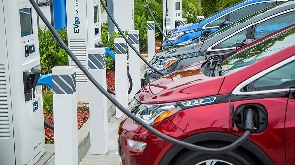With an annual payment of about US$500 million for 2000 megawatts (MW) of excess capacity in electricity generation Ghana is seeking to cure these “take or Pay” contracts with the National Electric Vehicle (EV) Policy.
Energy Minister, Dr. Matthew Opoku Prempeh speaking during the launch of Ghana’s Electric Vehicle (EV) Policy at the on-going COP28 gathering in Dubai, UAE expressed confidence that the policy can help create an avenue to utilize the existing excess capacity.
“Indeed, the launch of the EV policy is timely for the Ministry of Energy as we are working to deal with excess generation capacity with cost implications, and to ensure adequate, reliable, and affordable low-carbon electricity for the Ghanaian economy,” he said.
The West African country has an installed capacity of 5,134 Megawatt (MW), with a dependable capacity of 4,710 MW and a Peak electricity demand of 2,700 MW.
Ghana is obliged to pay for the about 2,300 MW excess capacity contracted on a take-or-pay basis that it does not consume.
The uptake in electric vehicles, therefore, promises to help mitigate this challenge. An estimated 17,660 PEVs were imported into Ghana between January 2017 and December 2021.
International Trade Centre estimated that 98% of the Battery Electric Vehicles (BEVs) in use in Ghana were imported from China. The Ghana Revenue Authority (GRA) data show that standard hybrid-electric vehicles (HEVs) have the highest representation (91.5%) followed by BEVs at 5.1%. and plug-in hybrid electric (PHEVs) at 3.3%.
“With these two vital policies [ energy transition and EV Policy], Ghana is positioned to attract investments into the clean and low-carbon energy and e-mobility sectors, create thousands of decent jobs and achieve value addition to the enormous natural resources through green and eco-friendly manufacturing of products and technologies for the economy.
“We are ready for the electric vehicle and e-mobility evolution. With an electricity access rate of 88.85%, diffusion of electric vehicles on a national scale is possible. Thus, every region and district of the country should be able to participate in this budding industry,” he remarked.
Click to view details



Business News of Wednesday, 6 December 2023
Source: aviationghana.com

















